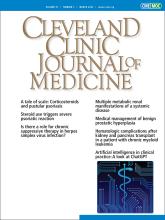ABSTRACT
Medical management of benign prostatic hyperplasia (BPH) has progressed gradually in recent years and remains the starting point for most symptomatic patients seeking treatment. Beyond well-known alpha-blockers and 5-alpha reductase inhibitors, there is growing evidence for the use of phosphodiesterase-5 inhibitors and beta-3 agonists in managing the condition, which may afford additional relief of “bothersome” symptoms in some patients. This review details contemporary medical management of BPH with an emphasis on the indications for certain classes of pharmacotherapy and their relative benefits and side effects. Surgical and procedural treatment of BPH is covered in a separate review.
- Copyright © 2024 The Cleveland Clinic Foundation. All Rights Reserved.
- Eiftu S. Haile, MD⇑
- Address:
Eiftu Haile, MD, Glickman Urological and Kidney Institute, Q10-125G, Cleveland Clinic, 9500 Euclid Avenue, Cleveland, OH 44195; hailee{at}ccf.org
- Bradley C. Gill, MD, MS
ABSTRACT
Medical management of benign prostatic hyperplasia (BPH) has progressed gradually in recent years and remains the starting point for most symptomatic patients seeking treatment. Beyond well-known alpha-blockers and 5-alpha reductase inhibitors, there is growing evidence for the use of phosphodiesterase-5 inhibitors and beta-3 agonists in managing the condition, which may afford additional relief of “bothersome” symptoms in some patients. This review details contemporary medical management of BPH with an emphasis on the indications for certain classes of pharmacotherapy and their relative benefits and side effects. Surgical and procedural treatment of BPH is covered in a separate review.
- Copyright © 2024 The Cleveland Clinic Foundation. All Rights Reserved.






